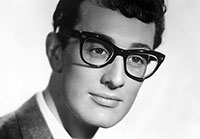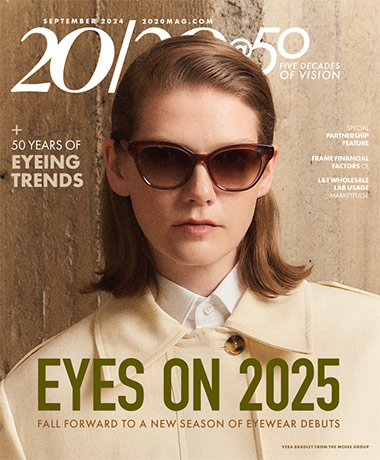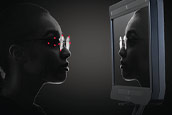 |
"Why do you love glasses so much?"
My wife asked me this recently, as I was drooling over an eBay auction for a lot of vintage 1960s browlines and fades (which, sadly, I lost). It was an honest, and, quite frankly, valid question. The fact of the matter is, I do love glasses. Although working as an optician is my day job, I'm never really "off." It's an all too common experience for my friends and family to be dragged along at the mall to an optical store or sunglass shop so that I can peruse the new releases, see which old favorites are still being offered, and, usually, try a few things on for size. On slow weekday evenings, I'm a regular visitor to Ed Welch's Eyeglass Warehouse and The Fedora Lounge, where I can easily spend a good hour perusing photos of old glasses and old photos of people in glasses, soaking up the style, seeing who was wearing what and when. On numerous occasions I've attempted to begin work on a site I call The Brow Blog, cataloging the appearance of browline glasses in classic cinema and television (please don't steal my idea).
So the question is very valid. Why do I love glasses? Why do they consume so much of my time and, one could say, identity? I gave it a lot of thought; and, I believe, came up with an answer: Glasses represent one of the greatest social triumphs of mankind in the 20th century.
SAY WHAT?
What am I talking about? You probably already know the answer, though you've probably never given it much thought. As I've discussed in my columns before, glasses—at least in the public mind—have long been a part of the realm of fashion. One is hard pressed to find a pair of frames not stamped somewhere with the logo or name of some designer or design studio, often in the form of a long or esoteric name that is completely devoid of meaning for all but the most dedicated readers of Vogue. Yes, glasses are an accessory now. It's easy to forget is what they were before: Medical devices.

|
What is a medical device exactly? I'll spare you all the boring legalese of the official definition, and simply cite a few examples: Crutches are medical devices. Pacemakers are medical devices. Prosthetic limbs are medical devices.
Medical devices are things that allow people to overcome handicaps and live their lives in a convenient manner; and this is the triumph of glasses. In theory, glasses could be as simple as crutches: Multiple sizes to fit the wearer's dimensions in one, easily reproduced design. Indeed, for many years, this was essentially the theory behind frame manufacture: Look back at the early days of mass produced spectacles and you'll find yourself inundated with round, metal frames. These were the dark days of spectacle wearing; when glasses were looked upon with the same stigmatizing eye that much of society today casts upon the disabled. When seeing glasses on someone's face meant that they were less than; that they were blind.
Don't stare at the man in the glasses, son. Don't draw attention.
It's hard to forget that needing glasses makes one, essentially, handicapped.
And again, this is the triumph of glasses.
As a people, we could have allowed glasses to continue carrying a stigma, continued to perceive wearers as weak, incomplete. Yet, whether we have realized it or not, we have not only jettisoned that stigma but embraced the very symbol of our handicap as an icon of personal identification. Think, for a moment, what comes to mind when you hear the names Buddy Holly; Theodore Roosevelt; Vince Lombardi; Steve Jobs. Odds are you think of their achievements in a certain field, their intelligence or physical prowess; for some of them, you may even think about their glasses.
But did you think "blind?"
Probably not.
What could have remained a symbol of disability has instead become a means of self identification. We, as a people, have taken a medical device and turned it into a fashion statement: A means through which we communicate a new identity for ourselves, forged from the very thing that would have confined us to a role not of our own choosing. Hipster. Artist. Executive. Sassy librarian (you know you've thought it).

|
In the cause of destigmatizing disability, glasses have become both the standard bearer and general, signaling the possibilities of a world that does not glance askance at those with "disadvantages." They are a symbol of individuality, triumph over adversity, and the possibilities the future holds. Will we see the day when crutches are made of shellacked black wood and embossed with giant, gold Gucci logos? Or when wheelchairs seats are quilted in Vera Bradley patterns? Perhaps. And if that day should arrive, we will have the example set by glasses to thank for permitting individuals to feel good about themselves, circumstances be damned.
That is why I love glasses.
I think.
Either that, or I'm just some weird guy.












